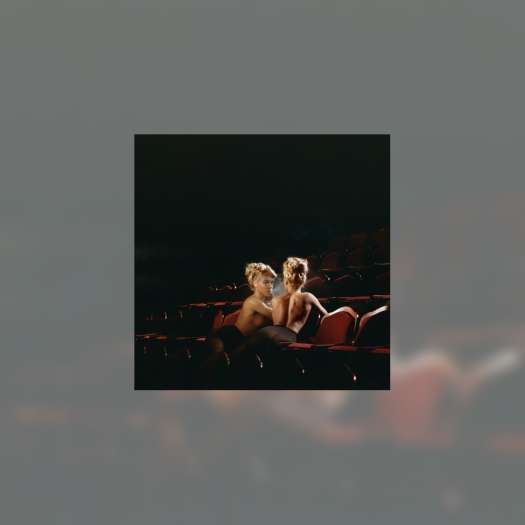The legend is almost irresistible. The tormented life of Marvin Pontiac, born Marvin Toure, of an African father and Jewish American mother, drifting across the musical landscape of blues and early rock'n'roll, changing his name to Pontiac believing it "quintessentially American," existing below the radar, on the fringe of society until his descent into madness and his death in 1977, struck by a bus. Pontiac counts David Bowie, Iggy Pop, Leonard Cohen and Michael Stipe amongst his fans, and Flea is quoted as saying he listened to nothing more than Pontiac in his formative years as a bassist. A new compilation from the legendary Marvin Pontiac finally collects his greatest hits, documenting the lost work of a true genius. The snag is, it's not true ? the collected works of Marvin Pontiac are in fact recordings by Lounge Lizard John Lurie.
In 1970, a former American Basketball Association star named Fulton James, having dabbled with the Black Panthers, wrote an incendiary film called Soul Ecstasy; its short-lived release caused riots and struck fear into the heart of white middle America. Though no complete print of the film was saved, the soundtrack was found whole, and was released last year by Emperor Norton records. This time, though, the hype was even easier to see through ? with its fusing of South Asian sounds, Hong Kong imagery and slick-sounding production, Soul Ecstasy was too good to be true, and the label soon fessed up that the soundtrack by the group Inner Thumb, was in fact the work of Ross Harris and Craig Borrell, better known as DJ Me DJ You. (See sidebar, opposite page.)
There were clues to their "fakeness," of course. If credited appearances by John Medeski, Marc Ribot, Angelique Kidjo and Kate Fenner weren't enough, the Marvin Pontiac record is the only overtly non-Lurie project on his label, Strange and Beautiful. And for those with a keen eye for detail, the producer of Soul Ecstasy is one Ricardo Tubbs, who spent the 80s chasing bad guys around Miami with Sonny Crockett. A few now red-faced critics were fooled, though: one claimed to have been an early fan of fictional basketball player-turned-director Fulton James; another lamented the state of all their old Marvin Pontiac on vinyl.
Entertainers have long used different names: to maintain anonymity in the face of public scrutiny (the Big Bopper hid his real identity long before Ziggy dreamt of spiders); to squirm away from contract obligations (Prince); or like Lurie's Marvin Pontiac, to duck audience expectations and potentially reach an audience uninterested in Lounge Lizard jazz. Hip-hop madman Kool Keith has been swimming in the turmoil of confusing identities throughout his career. (He even had one persona, Dr. Octagon, assassinated by another, Dr. Dooom.)
It is in this context that new strains of performance identity are beginning to emerge, artists fully aware of the power of persona, and who are turning themselves, their work and their audience into co-conspirators in a vast hall of mirrors. Meet two of them: a sex bomb/cruise ship social convenor and a super-villain Jewish MC, both Canadians currently leading a friendly take-over of the Berlin underground. You may call them Peaches and Gonzales.

Peaches
"Peaches is not my whole personality," she says, "but I think it's fast-forwarded a lot of things in myself that I didn't know how to bring out, with sex or with music. To me, a persona is also about becoming yourself ? the persona gets filled with yourself." Gonzales, for his part, concurs: "Every personality trait that you would attribute to Gonzales is safely attributable to me."
Of course, Peaches and Gonzales are not what their mothers called them; they evolved as part of a short-lived sleazy Toronto rock outfit called the Shit. Peaches, also known as Merrill Nisker, formerly of avant art rock project Fancypants Hoodlum and "Indigo Girls Jewish North York folk thing" Mermaid Café, took her name from the way Nina Simone sings the word "peaches," while Gonzales was named by a random Berliner who shouted "Chilly Gonzales" at him on the street. In his previous musical incarnation, Gonzales (born Jason Beck) was Son, a piano-playing talent who quickly bored himself with the Elvis Costello/Prince rock of his Warner debut, Thriller; the label, for their part, was even less excited when Son created Wolfstein for his second effort, an album and embryonic persona that, in retrospect, provided hints of Gonzales to come.
"I was still hopeful that music would save me when I was in Canada," Gonzales says on the phone from Berlin; in the background, Peaches has the volume up on some digital video she recently shot in Toronto. "When I left, it was like admitting that music wouldn't save me, and I wasn't sure what would. As it turned out, it was this idea of character and persona, and specifically letting out negativity through this super-villainous idea. When I left Canada, I had all these emotions that aren't necessarily bad, but that if channelled in the wrong way can turn out bad: competitiveness, jealousy, superiority, megalomania ? things that are definitely in me. I just created this Chilly Gonzales idea as a receptacle for all that shit. It gives my real life maybe one percent more peace because I have a way out for that."
Bearing the simple tag of "Jewish MC in Berlin," Gonzales recorded an album (Uber Alles, on Germany's Kitty-Yo, who also released Peaches' self-titled debut EP) but decided to concentrate not on music but on media manipulation, with great success. Not only did the UK music press jump quickly on his hype wagon, Gonzales has recently found his way into several niche Jewish magazines as well. "I feel like I had a true job switch ? I really was focused on the music, consciously thinking about the notes. [Gonzales has] given me total detachment. It really made me think which piece of music worked as a weapon in this super-villainous way. Instead of songs, you have goals, you have people you want to get rid of . The persona focuses you ? you're making character pieces.
"I like to spend as little time as possible on the actual music making," Gonzales continues. "I'm a master of music now; I'm a student of media manipulation. So many clichés are true ? bands do switch directions, they do get second thoughts about how their second album was ? but that is just so boring. I decided to not contribute to the increasing bullshit. To think about slightly more fantastical answers that are also true, but maybe veer into the abstract, maybe veer into some heroic version of myself. I like to imagine that Gonzales is a role model to some person that I've always wanted to be. It's frustrating when you try to represent a complete human being [in the media] and it doesn't work. Gonzales is not a complete human being. He's just my futuristic hero, and it turns out that he's a bad-ass super-villain who doesn't give a fuck."

Gonzales
Four days before my chat with Gonzales, Peaches is closing up shop in Toronto before she relocates, and appropriate for such a bomb-ass bitch, we're meeting at the Triple X Diner. It's more innocent than it sounds, and maybe, so is Peaches. She's been Peaches for more than two years now, but revealingly, "now that I'm leaving this week, everyone's calling me Merrill." She's always noticed differences in how people take to her persona. "Musicians are always calling me Peaches ? they want to play all the time. In the art' world, people want to call me Merrill. They are very comfortable with Peaches as persona,' as art, and they always call me Merrill."
The (un)comfort level has shaped the Peaches experience from the beginning. "In my normal conversation, I'm not gonna say Hey, pull down my pants and see God in my burning bush,' but on stage, I'm gonna say shit like that." Pushing the boundaries is easier to deal with "in character," not so much for Peaches but for the audience. "It's like straight guys getting into a drag queen show: Hey, she's hot,' you know. But I think Peaches fucks with your head a little too. People stand at the door with their arms crossed, saying I don't like this,' but they're not leaving either."
The boundaries Peaches pushes are not just for shock value; in performance, she's a live sociological experiment. "I've got a gender fixation. I'm trying to bring in the entertainment value of me wearing a cock or Gonzales wearing boobs. It's buffoonery but it's also real. I'm not teasing. I'm playing around, but I want to play around."
The attention Gonzales has received, on the strength of his "Jewish MC in Berlin" tag, has merely served to confirm that "if you focus on the image and quotability, it will definitely work out better for you." Peaches has experienced it first hand as well: "People who have never seen me have created their own persona for me. I've never taken my shirt off, but people write about the Peaches All Nude Revue' ? it's not just me, it's whatever happens at a show. Always entertaining, always confusing."
"That's the danger with gimmicks," Gonzales says sagely. "You can't control them, you can just put them out there."
In 1970, a former American Basketball Association star named Fulton James, having dabbled with the Black Panthers, wrote an incendiary film called Soul Ecstasy; its short-lived release caused riots and struck fear into the heart of white middle America. Though no complete print of the film was saved, the soundtrack was found whole, and was released last year by Emperor Norton records. This time, though, the hype was even easier to see through ? with its fusing of South Asian sounds, Hong Kong imagery and slick-sounding production, Soul Ecstasy was too good to be true, and the label soon fessed up that the soundtrack by the group Inner Thumb, was in fact the work of Ross Harris and Craig Borrell, better known as DJ Me DJ You. (See sidebar, opposite page.)
There were clues to their "fakeness," of course. If credited appearances by John Medeski, Marc Ribot, Angelique Kidjo and Kate Fenner weren't enough, the Marvin Pontiac record is the only overtly non-Lurie project on his label, Strange and Beautiful. And for those with a keen eye for detail, the producer of Soul Ecstasy is one Ricardo Tubbs, who spent the 80s chasing bad guys around Miami with Sonny Crockett. A few now red-faced critics were fooled, though: one claimed to have been an early fan of fictional basketball player-turned-director Fulton James; another lamented the state of all their old Marvin Pontiac on vinyl.
Entertainers have long used different names: to maintain anonymity in the face of public scrutiny (the Big Bopper hid his real identity long before Ziggy dreamt of spiders); to squirm away from contract obligations (Prince); or like Lurie's Marvin Pontiac, to duck audience expectations and potentially reach an audience uninterested in Lounge Lizard jazz. Hip-hop madman Kool Keith has been swimming in the turmoil of confusing identities throughout his career. (He even had one persona, Dr. Octagon, assassinated by another, Dr. Dooom.)
It is in this context that new strains of performance identity are beginning to emerge, artists fully aware of the power of persona, and who are turning themselves, their work and their audience into co-conspirators in a vast hall of mirrors. Meet two of them: a sex bomb/cruise ship social convenor and a super-villain Jewish MC, both Canadians currently leading a friendly take-over of the Berlin underground. You may call them Peaches and Gonzales.

Peaches
"Peaches is not my whole personality," she says, "but I think it's fast-forwarded a lot of things in myself that I didn't know how to bring out, with sex or with music. To me, a persona is also about becoming yourself ? the persona gets filled with yourself." Gonzales, for his part, concurs: "Every personality trait that you would attribute to Gonzales is safely attributable to me."
Of course, Peaches and Gonzales are not what their mothers called them; they evolved as part of a short-lived sleazy Toronto rock outfit called the Shit. Peaches, also known as Merrill Nisker, formerly of avant art rock project Fancypants Hoodlum and "Indigo Girls Jewish North York folk thing" Mermaid Café, took her name from the way Nina Simone sings the word "peaches," while Gonzales was named by a random Berliner who shouted "Chilly Gonzales" at him on the street. In his previous musical incarnation, Gonzales (born Jason Beck) was Son, a piano-playing talent who quickly bored himself with the Elvis Costello/Prince rock of his Warner debut, Thriller; the label, for their part, was even less excited when Son created Wolfstein for his second effort, an album and embryonic persona that, in retrospect, provided hints of Gonzales to come.
"I was still hopeful that music would save me when I was in Canada," Gonzales says on the phone from Berlin; in the background, Peaches has the volume up on some digital video she recently shot in Toronto. "When I left, it was like admitting that music wouldn't save me, and I wasn't sure what would. As it turned out, it was this idea of character and persona, and specifically letting out negativity through this super-villainous idea. When I left Canada, I had all these emotions that aren't necessarily bad, but that if channelled in the wrong way can turn out bad: competitiveness, jealousy, superiority, megalomania ? things that are definitely in me. I just created this Chilly Gonzales idea as a receptacle for all that shit. It gives my real life maybe one percent more peace because I have a way out for that."
Bearing the simple tag of "Jewish MC in Berlin," Gonzales recorded an album (Uber Alles, on Germany's Kitty-Yo, who also released Peaches' self-titled debut EP) but decided to concentrate not on music but on media manipulation, with great success. Not only did the UK music press jump quickly on his hype wagon, Gonzales has recently found his way into several niche Jewish magazines as well. "I feel like I had a true job switch ? I really was focused on the music, consciously thinking about the notes. [Gonzales has] given me total detachment. It really made me think which piece of music worked as a weapon in this super-villainous way. Instead of songs, you have goals, you have people you want to get rid of . The persona focuses you ? you're making character pieces.
"I like to spend as little time as possible on the actual music making," Gonzales continues. "I'm a master of music now; I'm a student of media manipulation. So many clichés are true ? bands do switch directions, they do get second thoughts about how their second album was ? but that is just so boring. I decided to not contribute to the increasing bullshit. To think about slightly more fantastical answers that are also true, but maybe veer into the abstract, maybe veer into some heroic version of myself. I like to imagine that Gonzales is a role model to some person that I've always wanted to be. It's frustrating when you try to represent a complete human being [in the media] and it doesn't work. Gonzales is not a complete human being. He's just my futuristic hero, and it turns out that he's a bad-ass super-villain who doesn't give a fuck."

Gonzales
Four days before my chat with Gonzales, Peaches is closing up shop in Toronto before she relocates, and appropriate for such a bomb-ass bitch, we're meeting at the Triple X Diner. It's more innocent than it sounds, and maybe, so is Peaches. She's been Peaches for more than two years now, but revealingly, "now that I'm leaving this week, everyone's calling me Merrill." She's always noticed differences in how people take to her persona. "Musicians are always calling me Peaches ? they want to play all the time. In the art' world, people want to call me Merrill. They are very comfortable with Peaches as persona,' as art, and they always call me Merrill."
The (un)comfort level has shaped the Peaches experience from the beginning. "In my normal conversation, I'm not gonna say Hey, pull down my pants and see God in my burning bush,' but on stage, I'm gonna say shit like that." Pushing the boundaries is easier to deal with "in character," not so much for Peaches but for the audience. "It's like straight guys getting into a drag queen show: Hey, she's hot,' you know. But I think Peaches fucks with your head a little too. People stand at the door with their arms crossed, saying I don't like this,' but they're not leaving either."
The boundaries Peaches pushes are not just for shock value; in performance, she's a live sociological experiment. "I've got a gender fixation. I'm trying to bring in the entertainment value of me wearing a cock or Gonzales wearing boobs. It's buffoonery but it's also real. I'm not teasing. I'm playing around, but I want to play around."
The attention Gonzales has received, on the strength of his "Jewish MC in Berlin" tag, has merely served to confirm that "if you focus on the image and quotability, it will definitely work out better for you." Peaches has experienced it first hand as well: "People who have never seen me have created their own persona for me. I've never taken my shirt off, but people write about the Peaches All Nude Revue' ? it's not just me, it's whatever happens at a show. Always entertaining, always confusing."
"That's the danger with gimmicks," Gonzales says sagely. "You can't control them, you can just put them out there."




